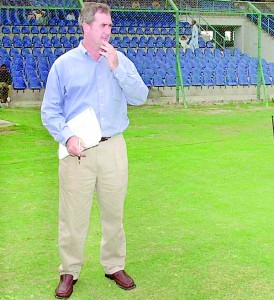Cricket ethics, Tim May and other panjandrum
View(s):There are certain things on this good god’s earth that we do not wish to see, hear or talk about. They are best kept unspoken under strict wrap like the fabled ‘Pandora’s Box’. Yet, there are times they just surface like small rocks that protrude when the tide recedes. The stubborn fact is — it is lying dormant just below the skin of our bodies. But when the tide recedes the inherent qualities in us bring out the great divide.
Last week the world of cricket was set on fire when the Board of Control for Cricket in India (BCCI) allegedly pressurised ICC voters (The ten captains of Test playing nations) to vote for India’s candidate and BCCI employee Lakshman Sivaramakrishnan and elect him to the ICC’s Cricket Committee, ousting the outspoken Federation of International Cricketers’ Association’s (FICA) Chief Executive Tim May.
 It is a known fact that the BCCI does not entertain or pay heed to FICA.
It is a known fact that the BCCI does not entertain or pay heed to FICA.
ESPN’s Cricinfo described the drama in these words: “Tim May’s removal from the ICC cricket committee following allegations of pressure exerted by the BCCI to install their preferred candidate Laxman Sivaramakrishnan should be the subject of an ICC ethics committee enquiry, according to the Federation of International Cricketers Associations (FICA) of which May is the chief executive.
“Ian Smith, FICA’s legal advisor, has also said that the players’ body is aware the ICC warned member nations not to interfere with the voting process but then did nothing when those warnings were ignored, accusing Boards of applying “direct pressure on their captains to amend their votes.” He said there had been a ‘very clear distinction’ between routine ‘lobbying”’ before an election and ‘threatening an employee to change their vote’.”
The BCCI that engages about half the world’s international cricketers in its lap dog project — the IPL — does not have a cricketers’ association in India, and does not encourage it either.
Here there are two subjects in focus. The first is BCCI’s apathy against FICA and the other is who calls the shots at the ICC. Both are mingled.
At the ICC it is the Cricket Committee which recommends new developments to the game and clearly new ideas like the decision review system (DRS) have not gone down with the Indian camp at all. The Indians had a bitter experience with the DRS in Sri Lanka when it was first tried out on an experimental basis. The BCCI reciprocated by steamrolling over the new law which was once introduced and then amended with the pressure exerted by the Indian lobby. So, the BCCI must have the notion that it should have a good hold in ICC’s Cricket Committee and nip the new laws that sprout in the very bud. With guys in the calibre of Tim May, that job may have been a little harder.
Recently the BCCI backed former Indian Captain Anil Kumble to become the chairman of the ICC Cricket Committee in place of former West Indian captain Clive Lloyd.
India with its cricket mad population of over 1.2 billion people has become not only the richest cricket playing nation but also the most influential cricket playing nation in the world too.
That is where the great divide comes in. During the first century of cricket it was the white sahibs who had the clear control over the game and the game was played in the Indian sub-continent by them as a past time and the ethnic subjects were mere onlookers or fill-in-the-gaps.
But, cricket being cricket caught up in the Indian sub-continent in a huge way and soon the subjects took to the game and they too became as good as their masters. But, initially the sahibs kept a strict control especially over the out of the boundary affairs.

Tim May - empty stadium is a lonely place indeed.
England and Australia were the two countries which called the shots and they had their satellite states in South Africa, New Zealand and the West Indies. During that period there was very little that India and Pakistan could do where the cricket administration was concerned. The Asian lobby in the world cricket administration was one of the reasons that kept Sri Lanka out of the full voting rights for a long period, in spite of the quality of the cricket played in the island was good in reality.
In 1983, the game changed on its head. India up to then had not enjoyed any major success in the game. With this world cup win the Indian public began to believe in cricket and then India won its second world title in 1997 in South Africa at the inaugural T-20 World Championships — the seams burst. First it was the ICL – the private tournament and soon the BCCI hi-jacked the idea under Lalit Modi and the IPL was born.
There was a time when Indian sub-continent worked in solidarity with India, Pakistan and Sri Lanka and later Bangladesh with four full votes having a certain say in ICC proceedings.
But now the rich guy next door has the dollar power. The West Indies is no more the western ally. The BCCI is in the position to bail them out from their $ predicaments. Sri Lanka is compelled to vote with India at the ICC even against its conscience, because without Indian tours the Sri Lanka Cricket coffers run dry and the story goes on.
It is said that England, Australia, South Africa and New Zealand voted for Tim May. This leaves India with Pakistan, Sri Lanka, Bangladesh, the West Indies and Zimbabwe – all the poor boards that could be under the $ orders when it matters. Yet, in reality they have the majority vote at the ICC. Isn’t this the new great divide?
Now we pose the million dollar question. Can world cricket be ruled by one country? Earlier it was the MCC club which ran the show and now it is India which has recreated the great divide.
The ICC sets the Future Tours Programme, but if the BCCI wants the West Indian players for its IPL, it persuades the West Indies to rearrange their FTP tour with Sri Lanka.
This is the stark reality in world cricket. The ICC may be able to move against an individual cricketer and impose its prevalent laws. Yet, it does not have the wherewithal to take on a dollar-powered vehicle when it breaks the very fundamentals of the ethics that the game stands for.
So coming home we wonder where we have gone wrong. Now in Sri Lanka it is no secret that top politicians control Sri Lanka cricket. Heads roll and heads change, but, everything happens with a nod from the top. Not only at the helm, but now it seems that the control even cascades to the ground level where players are concerned.
Yet, we have to grin and bear. In the present context law, dignity, checks and balances are only mere words and the wand of power controls it all.
This is how the fundamentals of democracy work. In the book the description may be different, yet, when it comes to reality and the ground situation of democracy becomes like a piece of clay.
PS: Finally the ICC comes back with a statement to this effect. “In view of the allegations already appearing in the media, the ICC wishes to state for the record that the re-vote took place according to the determined procedure and that the ICC has seen no evidence that supports allegations now being made that captains were put under pressure by their Member Boards to vote for a particular individual.”
* More episodes to follow.
Follow @timesonlinelk
comments powered by Disqus


